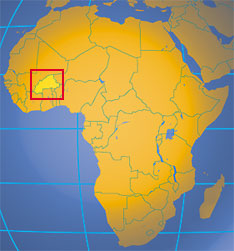





I just spent 5 days in Toussiana, what I would consider a small town rather than a village. Why do I say this, well it is a very well off village. Toussiana is placed between Bobo and Banfora right on the side of the road. There are multiple foot pumps stations for ground water, electricity for the majority of the houses, cell phone antennas, some houses with latrines and it is the market center for all the surrounding villages. Toussiana is also a successful mango production area and has a large dam that is surrounded with many small and large scale vegetable gardens.
Though Toussiana is booming in fruit and vegetable production there is still a mass emigration of the youth towards the cities. Many of the youth have little interest in continuing their father’s agriculture production and have set their sites on the bling and flash of the potential money and leisure activities of the city. Many of the older generation say that now that tv’s have come to town many of the youth have turned their interest and sights outward.
I was in Toussiana to learn a little about mango production in the area, the challenges, the opportunities and the perceptions of APIPAC (where I work) in the community. I happened to be there at the same time as a World Bank project evaluation visit. I got to watch the stress level of the local producer’s association, Tensia, reach maximum, the frenzy of preparing for the visit and the worry. I was staying with the president of the association, Rémé and he was so nervous. The World Bank visit arrived an hour late and was in a rush to quickly see an orchard and before we knew it they were off again, not stopping to have the meal prepared for them. Listening in on the conversation I did get to see that communication was by far the biggest challenge. The “Banker” would ask very specific questions looking for specific quantitative answers and the producer would answer with proverbs. Now if you understand the “Bankers” western culture you understand that he wanted specific measures and numbers to explain the benefit of the project, and if you understand the Burkinabé culture you will understand the producer’s proverb did answer with specifics and was quite clear on the benefits of the project. However, neither party fully understood the other. I’m not so sure how this lack of true communication will play out on the grand scale of things, as the “Banker” came to see a well maintained orchard and that is precisely what he saw.
On the other side from work, I spent the few days with Rémé and his family. Rémé is a short man in his late forties early fifties. He has strong diagonal lines scared into his cheeks, sign of his Toussiana ethinic origin (scaring practice not really continued today). He is the father of 9 kids, all which have or are presently going through school. Rémé speaks French, though his wife can’t. At home there are 3 kids left, ages 17, 14 and 12. There are also two other kids aged 10 and 12, the first daughters crippled son (he can’t walk and gets around by shuffling on his bum, so he never goes beyond the families yard) and a neighbours son. They were extremely nice with me, showing me around the area, teaching me how to roast peanuts and sharing many a meal of Tô with different sauces. I tasted Banji, a locally made drink from the sap of a type of palm tree. It is sweet and mild, but hard to describe the taste. They use all parts of this tree, drink the sap, eat the fruit (kind of looks like a coconut but inside has 3 sections with a jelly like substance with a very mild taste) and they use the leaves to weave baskets and traditional bee hives. I also had my first encounter with a naked chicken! This poor chicken was born with out any feathers, but it didn’t seem to notice or care. I guess when you want to eat it; it saves you lots of work!
I left Toussiana with the requests to return soon and a bag full of roasted peanuts.


1 comment:
I think the same because it's more like a small town because we can learn a lot of things of from this culture specially because they have interesting rituals which I'd like to learn.
Post a Comment